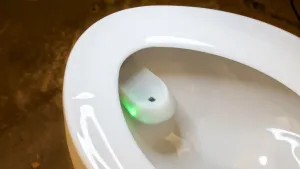Originally published by TechCrunch on January 27, 2023
If you enjoy some good toilet technology, then I think “urine” for a treat. Starling Medical is poised to launch its at-home urine diagnostic patient-monitoring platform, dubbed “StarStream,” that doesn’t rely on the traditional catching containers or dipsticks.
Now, if you’re thinking this technology sounds familiar, you would be correct: My colleague Haje Jan Kamps wrote about Withings’ U-Scan, a urinalysis device, earlier this month when the health-focused consumer tech company debuted it at CES. U-Scan also sits in the toilet for at-home monitoring.
However, Alex Arevalos, Starling’s co-founder and CEO, told TechCrunch that this is an underserved market — the global urinalysis market is forecasted to be valued at $4.9 billion by 2026, meaning there is plenty of room for Withings and a scrappy startup.
The Houston-based company wants to prevent hospitalizations from chronic conditions, including urinary tract infections, diabetes and kidney disease, and will eventually move into dozens of other health conditions that urine testing can detect, including preeclampsia during pregnancy.
Working in concert with urologist partners and insurance providers, the patient gets a reusable device that is attached to the toilet and is connected to artificial intelligence–powered digital health analysis. If a problem is detected after a patient uses the restroom, Starling connects them with their physician to learn more.
Starling’s StarStream is actually the company’s second iteration. Back in January 2020, Arevalos and co-founders Hannah McKenney and Drew Hendricks were working on a catheter device that allowed patients with neurological bladder dysfunction to pee at the press of a button.
Using some AI and spectroscopy sensors, the catheter would track the urine still in a patient’s bladder to detect urinary tract infections, which can lead to hospitalizations and sepsis.
While going through Y Combinator’s Winter 2022 batch, they got two ideas: to take the sensors and pair them with an easy-to-use at-home device that physicians and patients have been asking for, and put that device in the toilet.
And, rather than focusing on just neurological bladder dysfunctions, this would open them up to work with a larger market, including those with diabetes and preeclampsia kidney disease, which ends up being about a third of all patients in the United States, Arevalos said.
Over the past year, the company developed the device and the technology and has already validated its predictive models through a clinical study in partnership with Stanford University. It also closed on $3.4 million in seed funding, led by Rebel Fund.

